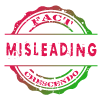
Personal care products like mouthwashes have been discussed on social media, with posts claiming that brands such as Listerine may kill beneficial oral bacteria along with harmful ones. These claims have raised questions among consumers. We examined these posts to assess the accuracy of these warnings.
Social Media Posts
Social Media Post advises people not to use Listerine or any other type of mouthwash citing that those harming to the good microbes too and kill all the microbes of mouth including good ones.
FB | Archive
We decided to do a fact check on this.
Fact Check
Do mouthwash products like Listerine actually eliminate 99% of microorganisms in the mouth?
Listerine’s ads boast that it “kills 99.9% of germs” linked to bad breath, plaque or gingivitis. In context, that claim comes from lab tests on disease‑causing bacteria. Listerine’s own website even specifies “bad “bacteria – i.e. microbes that cause oral problems. In practice, no rinse literally sterilizes the mouth. Any bacteria killed by a 30‑second swish are quickly replaced by saliva and food-borne microbes. As per the view of some international experts, mouthwash only contacts teeth briefly, so in normal use “there isn’t much concern” that it will wipe out the entire oral microbiome
Does this include the healthy bacteria that support oral and overall health?
Laboratory and clinical studies show that strong antiseptic rinses like Listerine kill broadly. A Rutgers study found that Listerine (and prescription chlorhexidine) “eliminated beneficial and harmful bacteria alike” in culture tests . In real mouths, a 2024 trial reported that three months of daily Listerine Cool Mint altered the oral microbiome: after Listerine use, some opportunistic species (Fusobacterium nucleatum, Streptococcus anginosus) were significantly more abundant, while certain helpful Actinobacteria (involved in blood pressure–beneficial nitric oxide production) declined . The researchers warned that regular use of alcohol-based rinses “should be carefully considered,” since killing protective bacteria can allow disease‑associated microbes to rebound
What do scientific studies and dental experts say about the safety and daily use of antibacterial mouthwash?
Dental experts of York Village Dental say mouthwash can be a useful adjunct when used properly. Most people can safely rinse twice a day after brushing and doing so “very rarely” upsets the mouth’s microbial balance. However, professionals do not recommend excessive or long-term overuse of potent antiseptic formulas. As the expert noted, alcohol-based mouthwash “may be safe to use for short periods,” but he would “not recommend long-term use” without a dentist’s guidance. In practice, the American Dental Association endorses such rinses only when they have demonstrated health benefits (reducing plaque/gingivitis) and are used as directed.
When we consider about the Listerine, they have both alcoholic and alcohol-free mouthwash products. More details can be read here in Listerine official website here
Is the viral claim supported by scientific evidence or based on marketing exaggeration and misinterpretation?
The viral claim exaggerates the reality. It is correct that Listerine can kill a very high percentage of targeted “germ” bacteria on contact, but this is a temporary effect on some microbes, not a permanent sterilization of your mouth. Both harmful and some beneficial bacteria are affected by an antiseptic rinse. Under normal use the oral microbiome quickly rebounds, and many studies find no major harm in occasional mouthwash use. That said, new research suggests daily heavy use of alcohol‑based rinses can shift the balance toward disease‑associated microbes. In summary, the “kills 99% of microbes’ slogan is marketing shorthand – it does not mean mouthwash permanently eradicates all good bacteria or ruins your microbiome.
Although Listerine’s advertisements claim to “kill 99.9% of germs,” this figure originates from laboratory experiments conducted under controlled conditions rather than from real-world use in the human mouth. In those tests, bacteria are exposed directly to undiluted mouthwash for a fixed period, conditions that are far more intense than an ordinary 30-second rinse. In daily use, mouthwash contacts oral surfaces only briefly, and saliva soon helps restore the microbial balance. Therefore, the “99.9% kill” slogan should be understood as a laboratory benchmark, not evidence that mouthwash sterilizes the mouth or eliminates all good bacteria.
Conclusion
As per our investigation, we were able to find out that using mouthwash products like Listerine does not excessively harm good microbiomes too as some social media posts suggest. Suggestion to stop the use of mouthwash products due to harm to the good microbiomes is just exaggerating the real scenario. There are lot of positive impacts to the oral health from using the mouthwash products too. As per some research, it has been found that alcoholic mouthwash products, make do harm to the oral health than non-alcoholic ones. If we consider about major brands like Listerine, they have both alcoholic and non-alcoholic products, pave the way for consumers to select whatever consumers prefer.

Title:Does Listerine Really “Kill 99%” of Mouth Microbes (Good and Bad)?
Fact Check By: Rashmitha DiwyanjaleeResult: Misleading


